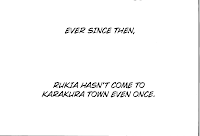I've seen some people who are speculating that Ichigo's poem is referring to Zangetsu,since the word "kimi" can be use for a neutral gender.
here's an explanation from someone about the word "kimi"
Yes it can be used for that as well. Kimi in itself isn't used solely for females and combined with the use of boku it almost sounds as if its a child talking. Kimi can be used for social equals or someone who is inferior in rank but very familar with. Nonetheless, kimi isn't really a 'special' gendered pronoun when it comes to Japanese as its used for informal conversations mostly, so why any shipper is getting worked up by this is quite sad really.
Besides, I have shown this to a couple of Japanese speakers and they confirm it seems rather gender-neutral to claim anything.
No you are misunderstanding kimi, as it is not used strictly from boy to girl (both genders can use it) and is used in informal conversations and people of higher rank too lower. It can be used for someone younger or older or in a sarcastic manner. Furthermore, the fact 'boku' was used makes it harder to claim that this was a convo that was strictly male to female as boku is typically childlike and used by young boys. Boku and Kimi are not gendered Japanese pronouns so you are wrong in your assumptions.
A/N :
Since I am not someone who will just believe in the words that was being told to me,or seen from one place (not that I care about the majority's opinion,because I definitely don't just follow the majority).I made my own research about this.
Here's what some people (not talking about BLEACH) that LIVES in Japan,not just SPEAKING Japanese language,says to someone who is looking for an advice,as to which word is to use in a conversation.They are not talking about BLEACH,nor the volume 49 poem either.
Second person pronouns:
君 kimi (2nd.P) originally meant "lord."
僕 boku means "servant"; but while usually an informal 1stP, 僕 boku can also be a Second Person used to address small boys.
Based from this explanation,that means that this...
Yes it can be used for that as well. Kimi in itself isn't used solely for females and combined with the use of boku it almost sounds as if its a child talking
...and this.
Furthermore, the fact 'boku' was used makes it harder to claim that this was a convo that was strictly male to female as boku is typically childlike and used by young boys.
...is definitely not the case for the volume 49 poem,since the speaker (Ichigo) is referring to himself as "boku" which is the 1stP,and it can only be interpreted as being addressed to a "boy/kid" if it was referring to the 2ndP.If someone uses it to refer to himself,which is the 1stP,it was simply an informal way of addressing themselves.
And by the way, the reason why some people use "kimi" to younger people is because "kimi" could also mean "kid" but that’s a different kanji.
Two Kimi’s :
きみ = kid (as you can see, that’s written in Hiragana)
君 = you
In writing, you have to use the kanji kimi instead of writing it in Hiragana.. or else it might look like you mean "kid" instead of "you." I don’t know if there’s a kanji for kimi that means kid.. so if you write using Kimi, use kanji.
There are other meanings of Kimi but are written in different Kanji, of course. So I really tell you to use the kanji if you want to use Kimi that means you..
Since KT used the kanji 君 = you,that means that it isn't referring to a kid.In other words,the speaker in volume 49 poem is not referring to a kid either.
KIMI
Personally, one of my favourite pronouns. kimi has a kindly air to it, one that can be friendly and personal, caring and parental, or even romantic. It is very familiar. It is never used by a younger/lower-ranking person to address an older/higher-ranking person. Only those “superior” (or equal) in some way can use kimi. However, it’s definitely not hostile.
This word uses the same kanji as the suffix –kun and has somewhat the same feeling.
Commonly heard:
- parental sort of figure towards children/youths
- superiors (including military officers) towards subordinates
- young person towards other young people (roughly the same age or younger)
Often used in conjunction with boku,though also used with all other pronouns.
Which means that this...
No you are misunderstanding kimi, as it is not used strictly from boy to girl (both genders can use it) and is used in informal conversations and people of higher rank too lower. It can be used for someone younger or older or in a sarcastic manner.
...is true.However,as it says,it isn't only used by someone who is in higher rank to a lower.It can also be used as something friendly and personal,caring in a parental manner,or even used in a ROMANTIC way.It is not purely about addressing an underling (higher to lower rank),or a younger/same age as the speaker.It would only sound RUDE when being used to address someone who is older or in a higher rank than the speaker.
Also,did you know that...
Most Japanese classes focus on formal, "proper" language and tend to discourage colloquialisms. This is for good reason. The "polite" forms in Japanese are necessary in learning grammar and word order, especially for beginners where more plain forms of the language can be confusing.
This is the reason why,if you asked someone about the word "kimi",they will recommend you to use it with caution,or better not use it at all,especially when you are just a beginner.
Also...
Japanese, unlike English, allows all pronouns to be omitted from sentences when they can be inferred from context. In spite of this — or perhaps because of this — Japanese has far more pronouns than the average language. There are more than three dozen Japanese words that can be translated as "I/me"* and even more that can be translated as "you". Each of them makes a different statement about the "speaker's gender", age, social status, and relationship with the addressee(s). To capture a little of the flavor, English translations sometimes use "this (category of person)" — this little girl, this humble peasant, this Bad Ass.
Writers, naturally, take advantage of this. The "wrong" pronoun can be a moment for comedy (see Different for Girls); the specific choice can say a lot about the character speaking. And it's easy to avoid revealing characters' names, for whatever reason.
Note that, even more so than in most forms of media, the language used in anime is heavily stylized and quite different from the way actual Japanese people speak in real life. Take everything you hear in anime with a grain of salt — non-native speakers who learned their Japanese from anime are easy to spot.
Notice the part where it says that "writers naturally,take advantage of this",because it can be useful in writing a story,to avoid revealing characters names,can have the idea about their age status,relationship,etc.
That's why...
No!!! You can use it also to males or children. But, Kimi may address only a female in the words of songs/dramas/mangas.
And here's another explanation from someone
The language used in j-dramas is also not representative of how Japanese people speak in real life, scripted to fit the narrative and character relationships only, so I wouldn't use it as a tool for learning to speak Japanese.
But if you're listening/watching in Japanese, knowing the difference can be helpful.
Here is my explanation (all "you"s): (A/N : I only put the word"kimi" since it was the topic)
"kimi" can be used for familiars/nonfamiliars but I would avoid using it. Also, "kimi" is used in songs, etc. kind in a romantic way.
and...
Kimi
君 A somewhat informal but still polite second person pronoun used mostly by men when addressing their equals or younger men and women. Usually the pronoun used between boyfriends and girlfriends. Can be used as a honorific as well, pronounced kun.
Kimi
The Japanese word for "you" that is generally used in an endearing manner. Be careful not to use it when reffering to a person who is either your equal or above you, but kimi would be more appropriate for a lover or a child. For most situations use the word "anata."
After reading all those explanations,this...
Japanese as its used for informal conversations mostly, so why any shipper is getting worked up by this is quite sad really.
...person doesn't seem to research things thoroughly about the use of "kimi" in Japanese,especially,when we are talking about MANGA.Besides,using informal words in a conversation means that the person is close to the one that he/she is talking/referring with.In a sense,being worked up by the fact that "kimi" is being used for informal conversations,and is used for someone who is in a higher rank to lower,or is someone who is younger,and don't acknowledge the possibility,or maybe,just didn't know that it can also be used in a romantic way,is quite sad as well.





























.jpg)




































